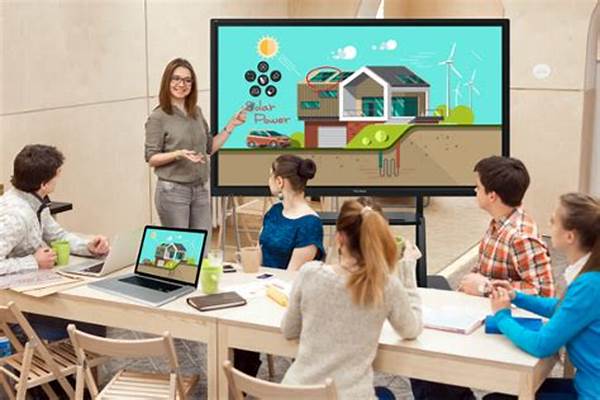In today’s rapidly evolving educational landscape, teachers and students alike are constantly seeking innovative solutions to enhance learning experiences. Say goodbye to traditional lectures and hello to a vibrant, interactive learning environment where technology meets creativity. Introducing the future of education: Audio Visual Learning Media for Blended Classrooms with Interactive Boards. Imagine classrooms free from monotonous lectures, replaced by engaging, dynamic lessons that captivate students’ attention. Let’s dive into how this revolutionary teaching approach intertwines technology and pedagogy to create seamless learning experiences.
Read More : Video Documentation Services For Corporate Events
Have you ever imagined a classroom where students actively participate, guided by intuitive technology that listens, learns, and adapts to their needs? With audio visual learning media, educational content becomes more captivating, bringing lessons to life through vivid visuals, dynamic sounds, and touchscreen technology. It’s not just education; it’s an immersive adventure! No more boring classes. Equip students with the knowledge they crave using tools specifically designed for the digital age. Now, let’s uncover the secrets behind this intriguing educational phenomena that’s redefining traditional learning.
The Role of Interactive Boards in Modern Classrooms
Enhancing Engagement and Interaction
Incorporating audio visual learning media in blended classrooms fundamentally transforms the way educators engage with students. Interactive boards are not just screens; they’re learning accelerators. Imagine a math equation magnified, animated, and manipulated in real-time—offering students a chance to see and solve problems dynamically. This creates a proactive classroom atmosphere where students participate actively rather than passively receiving information.
Interactive boards cater to varied learning styles, allowing visuals to accommodate visual learners, audio enhancements for auditory learners, and interactive elements for kinesthetic methods. This landmark shift doesn’t just provide information—it interacts with each student individually. Moreover, these boards provide a platform for collaborative learning. Students can gather around the board, brainstorming, and exploring subjects collectively. This collaborative nature fosters communication skills, teamwork, and a sense of community among peers.
The Power of Audio Visual Elements
Integrating audio visual learning media in classrooms goes beyond just putting interactive boards to use. The real magic lies in the meticulous combination of sound, sight, and interactivity that turns mundane topics into enthralling learning experiences. Studies indicate that students remember 80% of what they see and do. The real auditory and visual elements catalyze information retention.
Imagine exploring the rainforests of the Amazon right from your classroom chair. You see vibrant birds, hear the rustling leaves, and feel as if you’re present in that environment. This sensory involvement stands at the heart of advanced learning techniques, ensuring students engage deeply and retain knowledge effectively.
Meeting Diverse Educational Needs
The specific power of audio visual learning media for blended classrooms with interactive boards lies in its ability to address diverse educational needs. Each classroom is a melting pot of unique minds—students with distinct capabilities, learning speeds, and interest levels. By utilizing interactive technology, educators can bridge educational gaps, offering personalized learning experiences that resonate with every individual.
In practical terms, this approach welcomes inclusivity. For students with learning disabilities, for instance, multisensory teaching tools can be pivotal. Text-to-speech features benefit students with dyslexia, while visually stimulating modules aid those struggling with traditional text-based content. This inclusivity ultimately empowers students, providing equal learning opportunities and ensuring no one gets left behind in the digital classroom evolution.
Unlocking Potential: Why Audio Visual Media Works
Storytelling with Impact
The key to effective education often lies in storytelling. Audio visual learning media naturally integrates storytelling capabilities within interactive boards, allowing educators to craft lessons that have a lasting impact. With visual aids, students can visualize complex concepts more clearly, facilitating deeper understanding. Teachers are no longer just narrators but become facilitators of knowledge, guiding students through a journey in which they are active participants.
Read More : Recommendations For 4k Audio Visual Projector Screens
Innovating Traditional Teaching Methods
Audio visual learning media for blended classrooms with interactive boards leads the charge in bridging the gap between traditional methods and modern technological advancements. It’s a seamless blend of age-old best practices with cutting-edge innovation, creating a rich tapestry of knowledge delivery. By stepping away from static textbooks, educators open the doors to dynamic lesson delivery tailored to a tech-savvy generation.
Real-World Applications and Learning
One standout benefit of this technology lies in its capacity to simulate real-world applications. Subject matters like engineering, science, and arts can be explored through virtual simulations, enabling students to apply theoretical knowledge to practical scenarios. This approach doesn’t just prepare students for exams—it prepares them for real life, making education holistic and relevant, while reflecting the technological advancements witnessed in professional settings.
Key Features of Audio Visual Learning Media
Conclusion: Embracing the Future of Education
In conclusion, the integration of audio visual learning media in blended classrooms with interactive boards heralds a new era in education. This is not merely a trend—it’s a paradigm shift. With interactive boards, traditional education transforms into an experience that engages, educates, and empowers students in unprecedented ways. As we continue to navigate through the digital age, embracing such technology becomes imperative in preparing students for an ever-evolving world.
Encouraging Innovation and Engagement
Incorporating audio visual learning media into the classroom encourages both innovation and engagement, driving a deeper connection between learners and educators. As schools worldwide embrace this innovative teaching method, the boundaries of traditional learning continue to expand, unlocking endless possibilities and future-ready students.
Creating a Lasting Educational Impact
With the digital world advancing at an incredible pace, educational institutions must remain agile. Utilizing the power of audio visual learning media for blended classrooms with interactive boards ensures a robust, adaptive education system, ready to meet future challenges and create a lasting educational impact on generations to come. The journey has only just begun – and it’s an exciting one!
